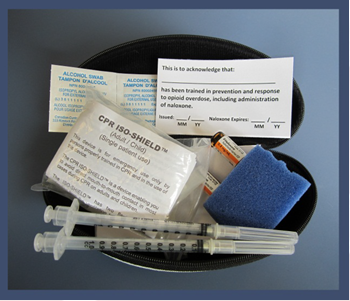THUNDER BAY -- A team distributing naloxone to combat drug overdoses in Thunder Bay faces some challenges tracking the results of its efforts.
Naloxone is a drug that counteracts the effects of opioid overdoses.
Staff of the Thunder Bay District Health Unit's Superior Points Harm Reduction Program hand out naloxone kits, focusing on high-risk people such as those accessing the needle exchange program or the hepatitis C program, or individuals recently released from prison. Family members and friends of people at high risk may also be given kits.
Training on how to administer the treatment is provided as well.
Superior Points senior outreach worker Rick Thompson says the team has distributed 161 kits since 2013. To date, only seven participants have confirmed that naloxone was administered for opioid overdoses. In all instances, the recipients survived.
Thompson noted that "what was really good, in most of the cases, people followed all the instructions that we teach, so that not only did they give the naloxone but they called 911 which is an important component of arresting the overdose...getting the professionals there as soon as possible."
He said that "If the kit is used, we hope that they would report back to us," noting that it's the only measure the team has for determining the effectiveness of the program.
Since high-risk individuals are not always easy to follow up with, Thompson suspects that more of the kits have actually been used than has been reported.
He cites a variety of reasons, including fear of being arrested by police on drug charges.
"People worry about getting into trouble. So it's entirely possibly, even though we gave them these kits for this express purpose, they may be afraid to come back and report that it was used."
As helpful as it would be to get more consistent feedback, Thompson said his team would prefer that naloxone kits never have to be used.
"Just by making them more aware through this process, you actually can lessen od's because people are getting more information. That's very important when we are teaching people because we are teaching them how to avoid an overdose in the first place."
With any luck, Thompson said, a kit that's given out will never be needed.
According to Ministry of Health data, there were 18 opioid-related deaths within the Thunder Bay District Health Unit's jurisdiction in 2015, including ten females and eight males.
